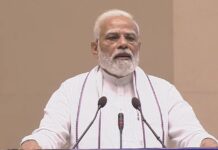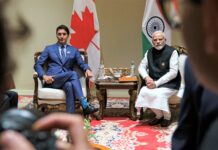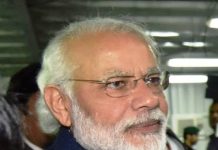Kathmandu (IANS): Making the first bilateral visit by an Indian prime minister in 17 years, Narendra Modi Sunday pledged not to interfere in Nepal’s internal affairs, announced a $1-billion line of credit and said New Delhi was determined to forge a new relationship with the Himalayan nation.
After wide-ranging talks with his Nepalese counterpart Sushil Koirala soon after arriving here on a two-day visit, Modi won millions of hearts by speaking in Nepali briefly during his 50-minute address to parliament where MPs repeatedly applauded him.
The Indian leader covered a range of subjects in his parliament speech, from religion to politics, from diplomacy to herbal medicines, and from information technology to infrastructure.
“We have always believed that it is not our task to interfere in what you do but to support you in the path you decide to take,” he said while addressing Nepal’s parliament, the first foreign leader to do so after the restoration of democracy in this South Asian nation in 1990.
Modi gave a ‘HIT’ formula for Nepal, saying India wants to help Nepal build highways (H), information highways (I) and transways – transmission lines (T). He said his government is keen to double power supply to Nepal and pipelines would be built to help transport oil to the Himalayan nation.
He said India would help Nepal emerge as a major exporter of herbal medicines and develop its tourism potential.
Modi said it is more expensive to make a telephone call between India and Nepal than it is to make a call between India and US and he was keen to change that.
In his speech, he appreciated the warm reception he was accorded after landing in Kathmandu earlier in the day on a two-day official visit.
“The respect that I have got is not for Narendra Modi or the prime minister of India. It is respect for the people of India,” he said.
“Our relations with Nepal are as old as the Himalayas and the Ganga,” he said.
In his speech, Modi made frequent references to the Hindu religion to underscore the ancient ties between the two countries.
“I come from Somnath’s land… I started my parliamentary journey from Kashi. Today I am standing at the feet of Pashupatinath,” he said referring to his home state Gujarat, his parliamentary seat Varanasi and the famed Shiva temple in Nepal.
“There is a temple in Kashi where the priest is from Nepal, and the priest of Pashupatinath is from India.”
He said that not only people of Nepal, but also those who believe in the power of democracy are looking at Nepal and this assembly.
He also hailed Nepal’s constitution drafting process during his speech in Hindi which was applauded by the parliamentarians of Nepal more than 20 times.
Modi also appreciated all those in Nepal who gave up the path of war and joined the democratic process.
He touched a chord by paying homage to the Gorkha soldiers who became martyrs in India’s wars against China and Pakistan.
Earlier Sunday, Prime Minister Koirala broke protocol to receive Modi at the Tribhuvan International Airport.
The Nepal military presented a guard of honour and a 19-gun salute.
In the afternoon, the Indian leader held one-on-one talks with his Nepali counterpart at the office of the prime minister and council of ministers at Singhdurbar.
Following this, delegation level talks were held during which Modi announced a $1-billion line of credit to Nepal, which will be spent for mutually agreed projects like road and hydro electricity projects, according to Nepalese Finance Minister Ram Sharan Mahat.
Modi said the biggest focus of the two nations should be development and said that “Sabka saath, sabka vikaas (Everyone’s support, everyone’s development,” is relevant for India’s neighbours also.
Later, three agreements were signed between India and Nepal including cooperation between Doordarshan and Nepal TV.
The two prime ministers also released a commemorative postage stamp to mark Modi’s visit.
At his remarks at the banquet hosted by Koirala, Modi said: “At many places in Kathmandu, people received me with such warmth, it shows the affection they have for the people of India,” he said.
“My doors are open, I invite you to bring any suggestions to review the 1950 Treaty, if you so want,” he said.
Another highlight of the day was when Modi united Jeet Bahadur Saru Magar, a Nepali boy he was taking care of, with his family members at his hotel in Kathmandu.
The meeting between Magar and his family members was the first task undertaken by Modi on arrival here.
On Tuesday, Modi will visit the Pashupatinath temple and meet leaders of various political parties before leaving for India.













